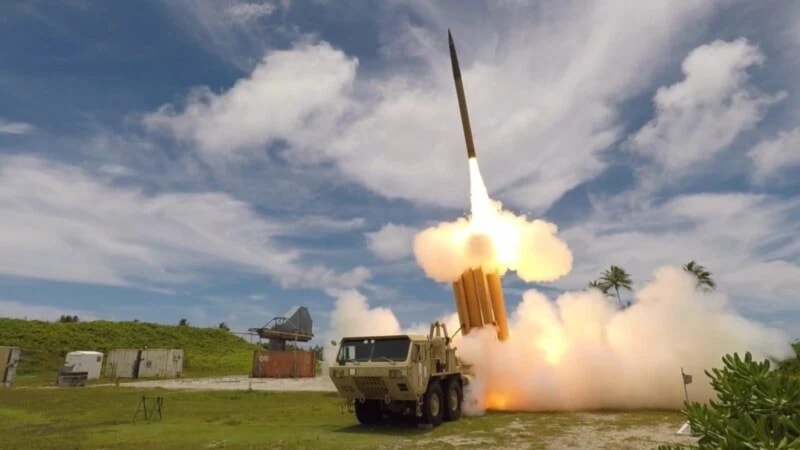'Israel's' fast track to strengthen missile defense: FT
Intense demands from the war have led the Israeli army to depend on the US to address shortcomings in air defense.
-

A THAAD interceptor is launched from the Reagan Test Site at Kwajalein Atoll in the Republic of the Marshall Islands in August 2019. (US Missile Defense Agency)
"Israel" is grappling with a looming shortage of interceptor missiles while enhancing its air defenses in response to increasing threats from Iran and its allies, the Financial Times reported, citing industry leaders, former military officials, and analysts.
The US, as per the piece, is working swiftly to address gaps in "Israel's" defense system, recently announcing the deployment of a Terminal High-Altitude Area Defense (Thaad) antimissile battery in anticipation of a potential Israeli strike on Iran, which could escalate tensions in the region.
US stockpiles are not unlimited
“Israel’s munitions issue is serious,” Dana Stroul, a former senior US defense official responsible for the Middle East told the Financial Times.
She noted, “If Iran responds to an Israel attack [with a massive air strike campaign], and Hizbollah joins in too, Israel air defenses will be stretched,” and cautioned that US stockpiles are not unlimited.
“The US can’t continue supplying Ukraine and Israel at the same pace. We are reaching a tipping point,” she stressed
Boaz Levy, CEO of Israel Aerospace Industries, which manufactures the Arrow interceptors designed to intercept ballistic missiles, told the Financial Times that he is operating triple shifts to maintain production.
“Some of our lines are working 24 hours, seven days a week. Our goal is to meet all our obligations,” he said, while emphasizing that the production time for interceptor missiles is “not a matter of days.”
Although "Israel" does not publicly disclose its stockpile sizes, Levy acknowledged, “It is no secret that we need to replenish stocks.”
'We are not seeing Hizbollah’s full capability yet'
The triple-layered air defenses in "Israel" have allegedly intercepted most drones and missiles launched by Iran and its allies, including the Iron Dome, David’s Sling, and Arrow systems.
In April, the Israeli army reported a 99 percent interception rate against an Iranian barrage of drones and missiles. However, during a subsequent attack on October 1, "Israel" struggled against over 180 ballistic missiles, with nearly 30 striking the Nevatim air base and one landing close to the Mossad headquarters.
In response, the US has deployed a Thaad antimissile battery to bolster the Israeli systems. This comes as "Israel" prepares for a retaliatory strike against Iran, which launched its missile barrage purportedly in retaliation for the assassination of Hamas and Hezbollah leaders. Despite Israeli efforts to target Hezbollah’s capabilities, the group continues to demonstrate its ability to strike deep into Israeli entities, with a recent drone attack resulting in the deaths of four Israeli soldiers.
“We are not seeing Hezbollah’s full capability yet. It has only been firing at around a tenth of its estimated prewar launching capacity, a few hundred rockets a day instead of as many as 2,000,” said Assaf Orion, a former Israeli brigadier general and head of strategy at the Israeli army as quoted by The Financial Times.
He noted, “Some of that gap is a choice by Hezbollah not to go full out, and some of it is due to degradation by the IDF... But Hezbollah has enough left to mount a strong operation.” Orion emphasized that Haifa and northern "Israel" continue to face daily rocket and drone attacks.
Analysts pointed out that security planners and "Israel’s" AI-driven air systems must make difficult choices about which areas to protect. According to official Israeli figures, over 20,000 rockets and missiles have been launched at "Israel" from Gaza and Lebanon in the past year.
“During the October 1 attack, there was a sense the IDF reserved some Arrow interceptors in case Iran fired its next salvo at Tel Aviv,” remarked Ehud Eilam, a former researcher at the Israeli Ministry of Security. He cautioned, “It’s only a matter of time before Israel starts to run out of interceptors and has to prioritize how they are deployed.”
Read next: 'Israel’s' air defenses are 'far from impregnable': FT

 4 Min Read
4 Min Read








